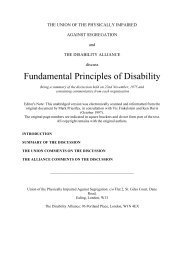Global-Report-Living-Colour-dr2-2
Global-Report-Living-Colour-dr2-2
Global-Report-Living-Colour-dr2-2
You also want an ePaper? Increase the reach of your titles
YUMPU automatically turns print PDFs into web optimized ePapers that Google loves.
98<br />
Inclusive Communities = Stronger Communities<br />
GLOBAL REPORT ON ARTICLE 19: THE RIGHT TO LIVE AND BE INCLUDED IN THE COMMUNITY<br />
CANADA In talking with a group of<br />
parents eager to learn about supported<br />
paid employment for their children an<br />
experienced advocate on job<br />
development for hard to place groups<br />
which include people with intellectual<br />
disabilities said “Everyone talks about<br />
life skill classes preparing people with<br />
intellectual disabilities to work but we<br />
know these are not the needed skills.<br />
People with intellectual disabilities need<br />
social competency skills, knowing how<br />
to move in the world, useful survival<br />
skills and interviewing skills. To keep a<br />
job they need motivation so we have to<br />
find jobs that are within their interests”.<br />
NICARAGUA Exclusion in the labour<br />
market in Nicaragua is very high.<br />
Although the law provides for a 2% of<br />
people with disability for companies<br />
with 50 employees or more, this is not<br />
met, both by the state and private<br />
companies. There are very few<br />
initiatives for people with intellectual<br />
disabilities in ASNIC we believe we<br />
have a moral debt to the persons with<br />
intellectual disabilities and their families<br />
AUSTRALIA The majority of people<br />
with intellectual disabilities are not in<br />
employment; of those who are most<br />
are in sheltered employment.<br />
MYANMAR (BURMA)<br />
Jobless population is high.<br />
the assistance of resource teachers. These resource<br />
teachers are very few and not adequately trained.<br />
Regular education teachers are provided a short<br />
term orientation on disability which is wholly<br />
inadequate. The new act Right to Education (RTE)<br />
has mandated compulsory, free education for all<br />
children. The reality is too far from satisfactory.<br />
‰ Employment<br />
For adults with intellectual disabilities one of the<br />
biggest barriers to living independently and being<br />
included in the community is exclusion from the labour<br />
market. Having an income in addition to the benefits of<br />
natural supports in the community when one is<br />
working is critical to real inclusion. Yet families and selfadvocates<br />
reported that the kinds of support that<br />
people with intellectual disabilities need to find and<br />
keep a regular job are not available. While supports<br />
such as job coaches and supported employment<br />
agencies exist in high income countries access to them<br />
is extremely limited and their effectiveness is uneven at<br />
best. In low income countries the approach by family<br />
organizations, INGOs and governments has been to<br />
repeat the segregated approach of sheltered<br />
workshops and day programmes which we know to be<br />
ineffective in achieving inclusion in the community.<br />
Most often the programmes which people have access<br />
to during the day are segregated life-skills programmes<br />
which do not develop the necessary employment<br />
related skills and most people who enter the<br />
programmes continue to go there without ever being<br />
“ready” to move into real jobs.<br />
Sometimes when there are no supports or services to<br />
guarantee inclusion, families take matters into their<br />
own hands as reported from Korea. “My son wants to<br />
be a barista. I think he needs experience in a coffee shop.<br />
He wants to work in a Macdonald or so, but it is very<br />
difficult to get a job there. I am thinking of being an<br />
owner of a coffee shop so that he can work there!”



